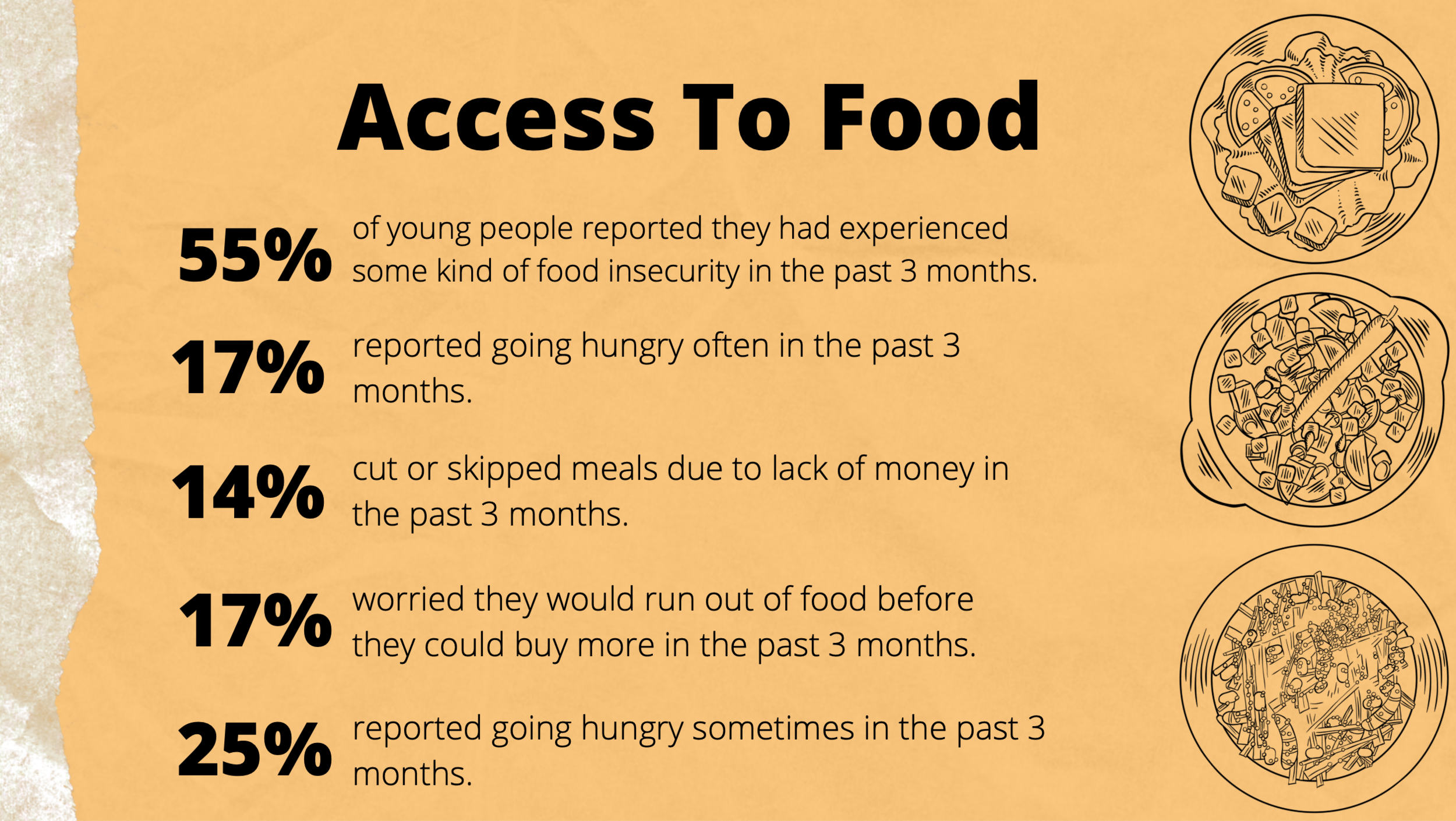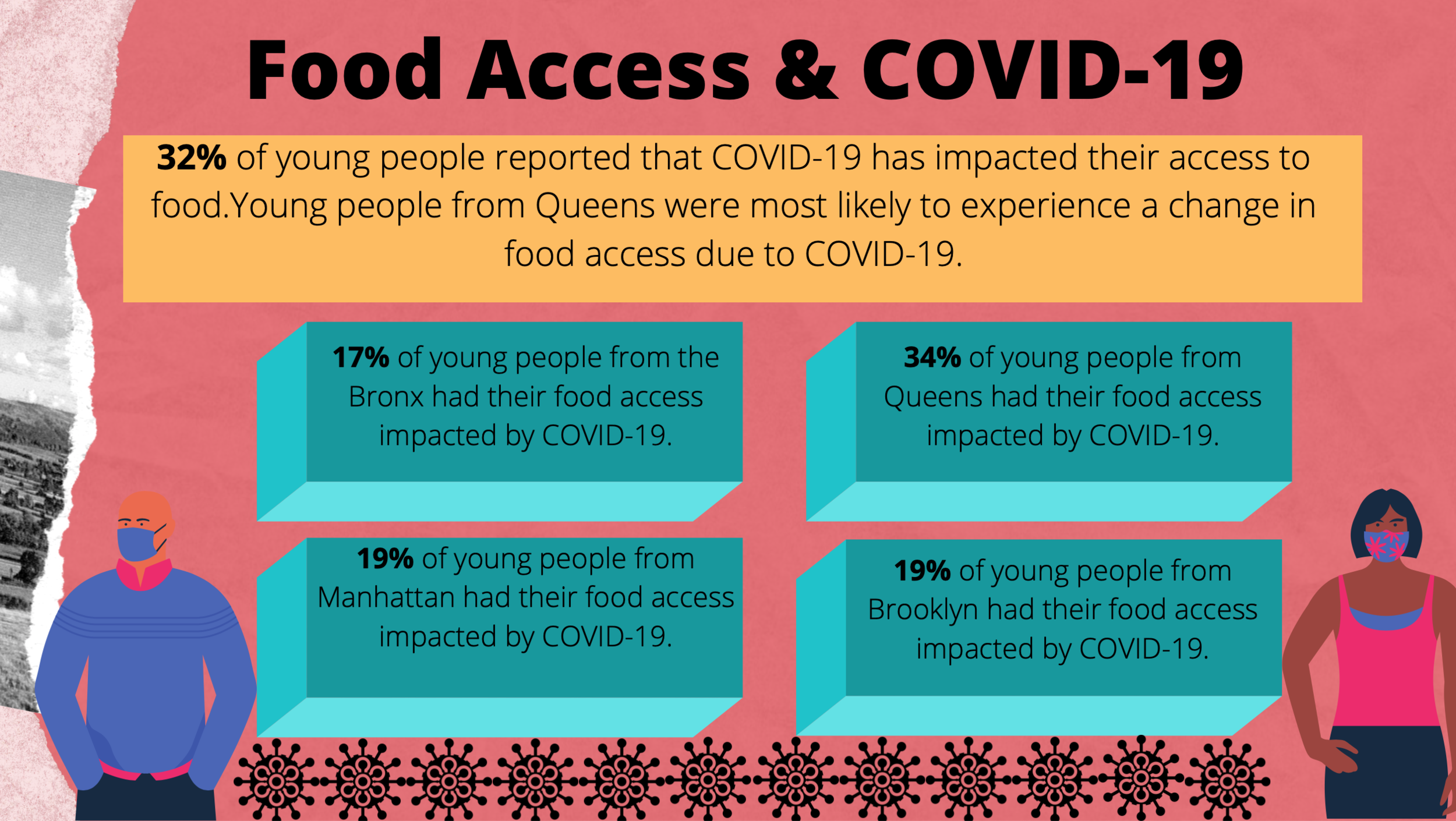As New York City (NYC) begins to recover from the depths of the COVID-19 pandemic, schools rush to reopen in order to provide youth with access to healthy meals. While food insecurity has been a looming issue for youth in NYC for many years, this problem has only been exacerbated by the pandemic. According to Feeding America, 1 in 4 — more than 466,000 children — in New York City are experiencing food insecurity, a 49% increase from pre-COVID-19 levels1. New York’s 15th District has the highest projected food insecurity rate for children in the country at 43.9 %2. With over 113 billionaires in New York City alone, why is it that our city’s youth don’t have access to something as crucial as a healthy meal?
Our team of youth and adult researchers called the Intergenerational Change Initiative launched our Youth Ask Youth (YAY) Census during the summer of 2020 as the pandemic was raging in New York City. This youth survey was created by young people for young people and covers areas related to Community, Learning, Health and Relationships, and Economics. Our survey found that over 55% of the 419 young people ages 13-24 who took the YAY experienced food insecurity in the three months before they took the survey. This percentage is even more severe than Feeding America’s projection.
We also found that 17% reported going hungry often in the past 3 months, 25% reported going hungry sometimes in the past 3 months, 14% cut or skipped meals due to lack of money in the past 3 months, and 17% worried they would run out of food before they could buy more in the past 3 months. We believe that these numbers are unconscionable. Way too many of the youngest New Yorkers are experiencing deprivation because our city has failed them.

Young people from the BX reported not having access to healthy food (not just during COVID-19) at more than twice the percentages as youth from other boroughs. 32% of young people reported that COVID-19 has impacted their access to food with most of the young people reporting a change in access to food as a result of COVID-19 being from Queens.

We hope to use our findings to ensure that a new Mayoral administration, new council members, and new borough presidents don’t leave young people without the basics while allowing wealthy adults to hoard more than they could spend in multiple lifetimes. We are working with the Department of Youth and Community Development (DYCD), YVOTE and many other youth groups to develop a New York City Youth Agenda that include our recommendations to which these politicians will have to respond.
We are developing recommendations from the ground up that have both long-term strategies to meet the food needs in our communities as well as some short term fixes. In addition to the recommendations being put forth by the CUNY Urban Food Policy Institute3, we have been inspired by the work of Raymond Figueroa Jr. and his youth farmers in the South Bronx. We amplify the call for the creation of micro-food hubs through gardens and urban farms that involve NYC youth and adults in all elements of building equitable and sustainable local food systems4-1) production, 2) processing, 3) distribution, 4) consumption, and 5) disposal. As a long term strategy, we think this will build local power to address hunger while we bring joy, beauty, and bounty to our neighborhoods. In the short-term, we think that in addition to our public schools as food distribution sites, we should let city-funded youth programs pivot to meet community food needs with funding flexibility5. We have also seen a lot of great work happening outside of institutions and want to support young people and youth programs to develop mutual aid initiatives to address food scarcity. Young people can help create community fridges in areas with the highest food needs so people can take what they need or give what they can6. This is something our team will be working on this summer to take immediate action while we push for policy change and greater investments in combating food insecurity.
Using youth-generated data to guide our advocacy in partnership with organizations like the CUNY Urban Food Policy Institute is something we would like to normalize. We will use the Youth Ask Youth census every year as an annual temperature check for how our city is doing in relation to youth. We hope that someday soon we will not have to fight so hard for the basics, like food and shelter (1 in 5 of the youth taking the YAY had also experienced homelessness) and we can focus on other objectives promoted by young people that will transform NYC into a place where ALL youth can thrive.
By Alexandra Rouvinetis and Sarah Zeller-Berkman, representing a team of researchers from the Intergenerational Change Initiative (ICI)
